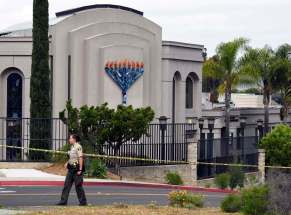Online hate speech isn’t just idle talk
Read this article for free:
or
Already have an account? Log in here »
To continue reading, please subscribe:
Monthly Digital Subscription
$0 for the first 4 weeks*
- Enjoy unlimited reading on winnipegfreepress.com
- Read the E-Edition, our digital replica newspaper
- Access News Break, our award-winning app
- Play interactive puzzles
*No charge for 4 weeks then price increases to the regular rate of $19.00 plus GST every four weeks. Offer available to new and qualified returning subscribers only. Cancel any time.
Monthly Digital Subscription
$4.75/week*
- Enjoy unlimited reading on winnipegfreepress.com
- Read the E-Edition, our digital replica newspaper
- Access News Break, our award-winning app
- Play interactive puzzles
*Billed as $19 plus GST every four weeks. Cancel any time.
To continue reading, please subscribe:
Add Free Press access to your Brandon Sun subscription for only an additional
$1 for the first 4 weeks*
*Your next subscription payment will increase by $1.00 and you will be charged $16.99 plus GST for four weeks. After four weeks, your payment will increase to $23.99 plus GST every four weeks.
Read unlimited articles for free today:
or
Already have an account? Log in here »
Hey there, time traveller!
This article was published 02/05/2019 (2415 days ago), so information in it may no longer be current.
People of various faiths, as well as anyone with compassion, have been reeling in recent months after a spate of high-profile attacks on congregations at places of worship.
On March 15, a gunman killed 50 people and wounded dozens more at two mosques in Christchurch, New Zealand. An Australian who declared ahead of time his intention to attack the mosques faces 50 charges of murder and 39 charges of attempted murder for the attacks, which he live-streamed on social media.
In April, the Islamic State group took credit for suicide bombings at churches in Sri Lanka during Easter services that killed more than 320 and wounded at least 500 others.
“It’s clear now, if it weren’t already before, that hatred against religious groups can result in violence and death. What should be acknowledged is that the hate speech itself is a form of violence, intended to dehumanize its targets.”
At the Chabad of Poway synagogue near San Diego, Calif., a gunman who attacked on the last day of Passover, killing one person and wounding three, had previously “expressed his intent to harm Jews” online, according to the district attorney, and had also acknowledged setting fire to a mosque in Escondido several weeks earlier.
These events are horrific, and one doesn’t have to go much further back to find more examples, such as the attack on the Tree of Life synagogue in Pittsburgh last October, or the mass shooting at a Quebec City mosque in 2017.
Organized terror networks such as IS are already surveilled by intelligence services around the world, and Sri Lanka’s failure to heed warnings that an attack was imminent points to the difficulty of responsive approaches to dealing with hate crimes that seek to kill or injure.
The man charged in the Pittsburgh mass shooting made public his anti-Semitic views on social media prior to the attack. Alexandre Bissonette, found guilty in the Quebec City mosque shooting, had a history of making Islamophobic and anti-immigrant postings online. And in a “manifesto” posted by the man charged in the Christchurch shootings, the anti-Islam sentiment is clear.
A recent report by the Globe and Mail showed the widespread use of online forums in Canada to spread hatred. What happens online isn’t “just the internet” — it’s real people being radicalized, and their targets are often minority religious or racial groups.
As San Diego County District Attorney Summer Stephan put it, referring to the 19-year-old charged in the Poway synagogue attack, hate crimes are often preceded by hateful words.
But the Globe and Mail’s reporting also showed that as recently as 2014, the Canadian Security Intelligence Service (CSIS) did not regard hate groups as a serious terror threat. It’s clear now, if it weren’t already before, that hatred against religious groups can result in violence and death. What should be acknowledged is that the hate speech itself is a form of violence, intended to dehumanize its targets.
And both are on the rise, according to an audit by B’nai Brith Canada’s League for Human Rights. The audit showed a 142 per cent increase in anti-Semitic incidents in Canada in the Prairie region, with 2018 seeing 74 acts of violence, vandalism and harassment aimed at Jews.
Religious groups in Winnipeg are considering adding security to their places of worship — some have already taken measures, including adding gates, security sign-ins and police presence.
Law enforcement has the means to investigate hate groups in Canada, as these groups increasingly turn to the internet to anonymously encourage people to acts of hatred or, as in the case of the Christchurch attack, document them in real time and disseminate them to a wider audience.
It’s time to treat the purveyors of online racist hate with the urgency reserved for terrorists.











